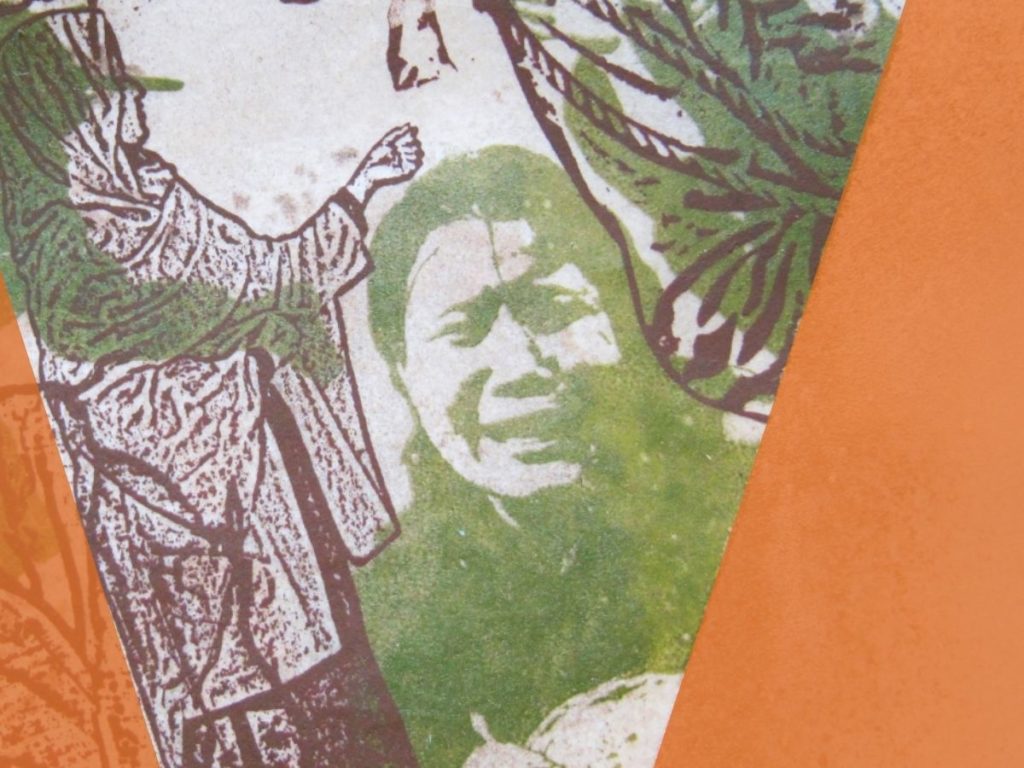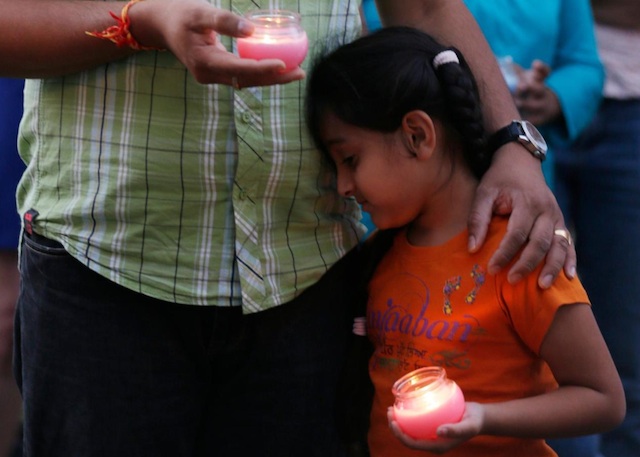but Gains a Movement
In his last sermon in Bay Ridge, Fr. K reminds an energized community that theirs is not a one-person movement.
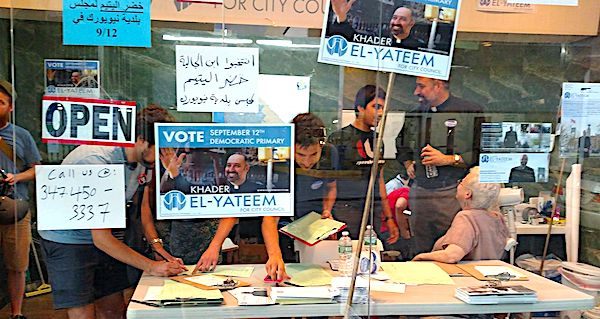
August 29, 2018
“When we hope for what we do not see – we wait for it with patience.”
— Fr. Kader El-Yateem
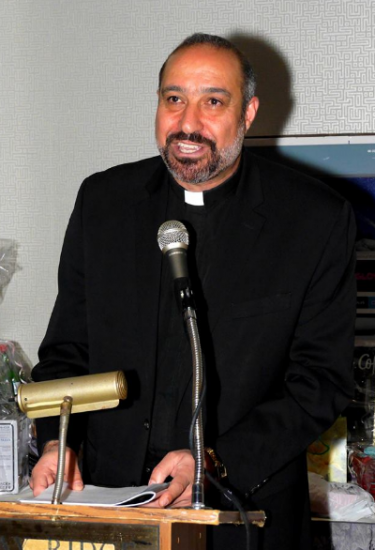
It was one of the first few days of the Islamic month of Ramadan this year that I woke up early, feeling tired and already thirsty from my fast. I quickly got out of bed, rummaged through my closet for a semi-formal outfit and got ready to head out and engage in worship for the first time in a Christian Sunday Church Service.
As a Muslim, I had never taken the chance to attend a Christian service, but it was a special occasion that led me to attend Salam Church in Bay Ridge that day. I was headed to honor Father Khader El-Yateem – or as those close to him like to call him, Father K – who was giving his last sermon to a room filled with tearful congregants, supporters, and friends who came to say goodbye to the respected community figure.
I had been to Salam Church many times before for meetings and town halls but never during worship hours. As I entered quietly into the church with my mother beside me, I adjusted my senses to the sight of the familiar red-coated walls of the prayer space dimly lit by burning candles set throughout the room and the smell of incense around us.
The emotional morning started with a flow of hymns, sung simultaneously in Arabic and English before El-Yateem walked in. Over six feet tall, his remarkable height loomed over the crowd as he started his sermon commemorating the holy day of Pentecost. With a solemn face full of emotion, he narrated the story of Jesus Christ telling his disciples that he would be leaving them to rise into heaven, or as Father K put it, “transition to a new journey.”
It was a fitting allegory that Father Khader’s final sermon would coincide to commemorate a moment in Biblical history where the disciples felt afraid and worried about being left without their leader: a political underdog who rose from a marginalized community to inspire the masses to challenge the Romans and their establishment of power and oppression. I couldn’t help but think this may be the same way that the congregation and the community felt losing Father K, an important leader of a political and cultural movement in Bay Ridge at such an important time of change.
***
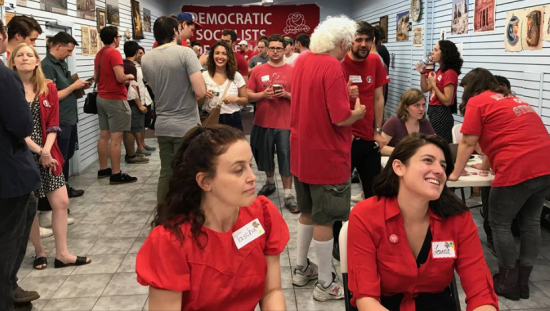
Earlier this summer after 20 years of service, Father Khader El-Yateem, leader of Salam Church, unexpectedly announced his transition to Florida for a new pastoral position. His announcement came as a shock, not only to his church members but to the many within the neighborhood who came out in droves 10 months earlier to cast a vote for El-Yateem in his aspirational run in the 43rd District’s Democratic primary race for a new City Council representative. The campaign, which at the time was one of the most compelling races in the New York City election cycle, invigorated the political energy of the Arab community in Bay Ridge, Brooklyn that has been struggling for decades for representation and dignity. El-Yateem would have been the first Arab American to be elected onto the New York City Council, a prospect that compelled hundreds of new voters, many of them with immigrant backgrounds, to come out for the first time to cast a ballot.
Moreover, running on an unprecedented democratic socialist platform in a historically conservative community, his win would have been the Alexandria Ocasio-Cortez victory for Bay Ridge; one that would have upheld a candidate who spoke for the community, pushed out the establishment incumbent, and shaken the status quo.
The aftermath of the unprecedented albeit unsuccessful run, however, left the Arab community in Bay Ridge at a crossroads moment. For the first time in their history, the community rose up in the thousands to participate in a strategic electoral process that would have spoken for the silenced. However, with the disappointing loss and the departure of their leader, many started questioning: “What would the political future look like for the Arab community in Bay Ridge?
***
Although Arabs have lived in New York City for over 100 years, the community has never had any electoral presence. Bay Ridge in Brooklyn is the most highly populated Arab neighborhood in the city, yet it has remained segregated along racial and political lines with little to no representation of the interests of its largest ethnic minority.
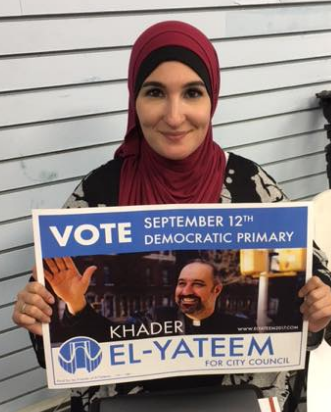
Growing up, Bay Ridge for me was a second home. It was the place where my mother brought all our labne, jibne (cheese), halal meat, and other groceries with the tastes of back home. It was where my father worked his many jobs in delis and restaurants and spent his nights smoking sheesha and playing cards with his friends. It was where we spent time with our community and made our memories.
I spent my summers taking long walks in Shore Road Park, running through the sprinklers at Owls Head, and watching movies at the rickety Alpine theater. Bay Ridge was a place where, as an Arab American, I could feel comfortable; a place that as a child, I saw women that looked like my mother walking the streets and saying Salam or Peace to one another. The tension of the racial divisions in the neighborhood was always there, however; but after 9/11, the situation in Bay Ridge was exacerbated as the events of the day drew lines between community members.
A middle class neighborhood made up predominantly of second- and third-generation Italians, Irish, and Greeks with a large constituency of firefighters, police officers and a military base, Bay Ridge had one of the highest percentages of mortality rates from the attacks, as many of the first responders and workers in the towers were residents of the neighborhood. This resulted in a misguided anger and hatred towards the Arabs and Muslims – people who looked like my family and myself, who were all cast as perpetrators.
On the other hand, the rising tide of Islamophobia of the post 9/11 era hit us – that same community of Arabs and Muslims in Bay Ridge – the hardest. Hundreds of families were targeted with increased deportations, surveillance campaigns by federal and local law enforcement agencies, and hate incidents became common experiences. The neighborhood that was once a safe place for the Arab community in New York to buy our local food, speak our language, listen to our music playing out of cars and to stories, and most importantly, be with our people, instead became infested with undercover police and informants, full of hostile neighbors, and a place where the trust and bonds of community members dwindled by the day.
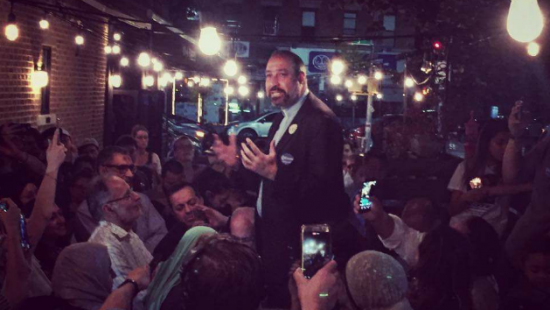
Over a decade after 9/11, the different communities in Bay Ridge have remained divided, with major disparities along class and racial lines and one-sided electoral support for the needs of wealthier whiter communities, as elected officials capitalized on the fear-mongering and conservatism of the community, what is now known as Trumpism, to stake their seats in office.
This was the backdrop for Father Khader’s bold campaign – facing the daunting challenge of pushing a struggling and politically disillusioned community to come out in the thousands to flip the district and prevail over the establishment candidate. In the last election, only 250 out of 40,000 potential Arab voters came out to vote.
“Should I trust his politics, morality, and his stake in our community, or would he be a compromiser, a collaborator, a false prophet who would only lead us for his own self-interest?”
As a young activist who worked with the Arab community in Bay Ridge, I was at first reluctant and skeptical when I heard that El-Yateem was running for a City Council seat in Bay Ridge. As a firm believer that electoral politics was only a tactic and not an end-all for our movement, I often felt that participating in elections was something that oftentimes distracted community work and detracted energy to political cycles rather than with the ongoing struggle.
I have learned from the past. Many times before I had volunteered to door-knock for up-and-coming candidates who expressed their sympathies for the Arab community in Bay Ridge. I realized that many candidates sought our communities’ support for their campaigns but were not truly dedicated to us, a community too controversial and easy to compromise on. Over and over, candidates and elected officials would come to our Eid prayer gatherings in our mosques, or to our community festivals, and say they would stand by us. Then over and over again we’d be disappointed as they would then turn around and pass policies that hurt our communities while ignoring our asks for progressive legislation on immigration, language access, police accountability, and other issues that effected our people.
As a long-time activist in the neighborhood, who came from a single-parent, immigrant, working-class background and worked with families like my own, these candidates never represented our interests. The prospect of a candidate running who was part of our community and therefore understood our issues better piqued my curiosity – but I was still skeptical and wondered what would make this new race with Father Khader El-Yateem any different?
***
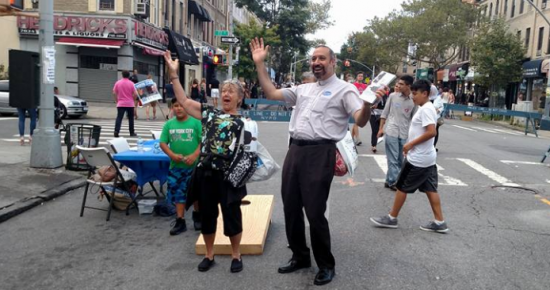
To me, El-Yateem was an “3amo”- the Arabic term of respect for an uncle or an elder male. But it is also a term I often use to refer to grown men in the community who liked to run things but were a bit out-of-touch. They were, in fact, often the ones who invited these candidates to our community gatherings despite their contradicting values and actions towards our people in order to maintain their own self importance.
I met El-Yateem while I was working as a youth organizer at the Arab American Association of New York (AAANY), and he was serving as a board member for the organization. For the staff, this meant he was the person we’d call when we needed an event space, to collect funding for a new air condition, or to give out plaques at our annual Gala. However, I didn’t know him well enough to decide – should I trust his politics, morality, and his stake in our community, or would he be a compromiser, a collaborator, a false prophet who would only lead us for his own self-interest? So before I decided to be a supporter, I listened, observed, and paid attention to his stances – especially on one issue that was close to my heart and would be a deciding factor in my committing to a campaign that would draw me back in to the uncomfortable world of political campaigning.
That issue was Palestine. As a Palestinian American who’s from a family of refugees and a long history of resistance – Palestine was a central issue to me. It was also a major issue for my community, Bay Ridge, which was once known to many as Little Palestine. It is ground zero for Palestine activism. As a child, I remember busloads of people from our mosques and Islamic schools leaving from the Islamic Center of Bay Ridge to Times Square for protests during the second intifada. I remember attending banquets and political speeches at Widdi Hall that would fill up with hundreds who came to listen and raise funds for the Palestinian cause.
“The power held by those living in beautiful brick houses, dangling American flags and touting signs of Republican Trump supporting candidates was challenged by the very community these people dubbed as backwards, lowly, and unwanted in their neighborhood.”
Within the hearts of the Arab and Muslim community in Bay Ridge, Palestine was ever present. However, on a political level, Palestine was completely erased in the platforms of local representation. Palestine, which remains a major, contentious cause for politicians to support despite international solidarity with Palestinian people, has been especially silenced and censored in the U.S., despite an ongoing killing of Palestinian people engaging in non-violent resistance.
In the Trump era, a new wave of candidates dubbed “PEPS’ – for “progressive except for Palestine’ – has sprouted. They buckle under pressure, refusing to support Palestine as a human rights issue due to fear of backlash from Zionist lobbies who conflate the support for Palestine as anti-semitism.
The safe bet for a candidate like El-Yateem, who had to garner votes beyond the reach of his own community to secure a win, would be to downplay his Arab roots and remain neutral or silent on controversial issues such as support for BDS, the international call to boycott, divest from, and sanction Israel. Politicians both on the right and left have been trying hard to legislate the outlawing of the BDS movement.
However, Father Khader quickly proved all my doubts wrong. As a Palestinian political prisoner himself, who remains dedicated to the practice of non-violent resistance, Father Khader took on the issue that is considered political suicide in the electoral arena and centered BDS unapologetically in his platform and mission. Although it cost him support from major unions and made him vulnerable to attack and criticisms, it proved to the residents of Bay Ridge, a.k.a. little Palestine, that although he didn’t want to rely on identity politics, he neither erased the identity, values, and needs of the Arab and Muslim community in Bay Ridge, which would remain centered throughout the encompassing platform.
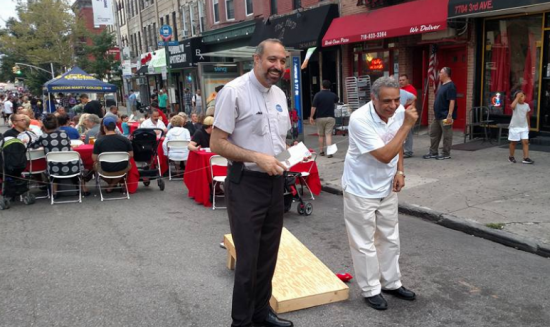
His platform included issues like housing reform, environmental justice, and improving the health of New Yorkers, which was something many hadn’t seen before. It could only have come from an Arab community member in Bay Ridge who was directly impacted by many of the policies that plague the minority community.
Not only among Arab candidates, but in NYC itself, the call to support a Palestinian Lutheran minister running on a Democratic Socialist platform that squarely confronts issues like immigration, BDS, and surveillance appealed to hundreds and became one of the most compelling campaigns of that particular election cycle. Inspired by someone who wasn’t willing to compromise the community for political power or fame, but instead wanted to center the most marginalized, I wholeheartedly began to volunteer and found myself dedicated to a call for principled local representation.
The campaign, which was remarkably run through grassroots volunteer effort – without corporate backing, and led predominately by women from the community – defied tradition in gaining votes. Powered through whatsapp messages among Khaltos/aunties, campaign speeches at wedding halls, and fueled by major support from DSA members around the nation, the grassroots effort shook the neighborhood and challenged a community.
As a volunteer knocking on doors, I still remember the surprised look on people’s faces as they opened the doors of their apartments to the sight of campaign canvassers dressed in hijabs and speaking Arabic. We were asking them to engage in a process which was both equally unfamiliar and fearful, especially for those who were immigrants – Arabic and Muslim descent – many of whom would never open their doors for these clipboard-toting strangers with the ever-looming fear of surveillance or ICE officers threatening the vulnerable population.
“Although the campaign was not won, the future of Bay Ridge would no longer be the same, as the force that came out for Father Khader was one to be reckoned with.”
However, it was this familiar, culturally sensitive, and on-the-ground effort that put an ease in people’s hearts and led so many people to come out with vigor to support El-Yateem. It was less of a campaign and more of a political movement that swept Bay Ridge as the prospects of real representation engaged entire families from the Hajjes, who could barely roll a word of English off their tongues, to the millennial Arab American voters, who had lost the Arabic language of their grandparents.
The electricity that was felt on primary election day was a sight to be seen. Dozens of volunteers were in the Al Noor Center, the unofficial headquarters of the campaign. By 6 a.m., the smell of manaeesh, bagels, and coffee swirled around the volunteers as they geared up to make calls, knock on doors, and poll-watch for the momentous day. Cars blasted celebratory Dabke music in excitement, and the poll sights were buzzing with new faces of voters, many of whom needed translation. Many had only been recently naturalized, and many others had never seen a ballot before. They came out, nonetheless, with an eagerness to support a new and true leader among them.
An unprecedented number of new voters, especially among the Arab community, was ready to engage in a process in which they were willing to overcome their distrust, out of their belief in the power of the potential outcome of that day. However, it was this freshness of the community that ultimately led to what they feared – corruption. The pure democracy that the West taunted their homelands with exposed itself to be not so different from their experiences of crooked elections in the Middle East.
By the late afternoon, several reports of voters being turned away, denied translation, and given the wrong ballots cast a dark shadow over the light that was emanating hours before. As the day went by, the immense joy and energy that was felt by the community slowly dissipated with reports reaching the campaign office of what seemed to be an organized effort to turn away, confuse, and deny what could have been hundreds of voters from casting a ballot. The campaign was facing a reality that although it was excelling despite the odds, it was not prepared to support community members who were experiencing voter suppression.
In the end, Pastor El-Yateem lost the primary race by 8 percentage points to his main opponent, Justin Brannon, who eventually won the City Council seat. Despite disappointment, the volunteers, supporters, and El-Yateem himself understood that they were witnessing a victory in Bay Ridge, one that was felt long before the results came out. El-Yateem was able to inspire almost 3,000 Arab voters to come out and push the status quo, earning 31 percent of the primary vote in Bay Ridge.
Despite the disenfranchisement of the Arab community in Bay Ridge, which for so long had no power or political presence, the hundreds of doors of Arab families that were knocked on were the ones that brought the change that would push upcoming candidates to take the needs of their community seriously in the future. Most of these families lived in tiny apartments that were neglected and kept unkempt by their landlords, on top of store fronts and in large multi-floor buildings.
The power held by those living in beautiful brick houses, dangling American flags and touting signs of Republican, Trump-supporting candidates was challenged by the very community these people dubbed as backwards, lowly, and unwanted in their neighborhood.
The night of the campaign ended at the Firefly, a cafe in Bay Ridge where El-Yateem was to host his victory party but instead addressed a crowd of over a hundred team members, volunteers, and supporters who stood with teary eyes and smiles. Knowing the amount of money, time, work, and energy all these people put into the campaign, one would imagine a sight of lamentation and sorrow especially in the face of El-Yateem. However, what we saw instead was a look of no regret – neither from him nor from his supporters who all stood there feeling proud of running a principled campaign.
There were cheers, zaghrootas, and one too many speeches ( as is the Arab way ) and I couldn’t help but remember the emotions of that night as I was sitting in the wooden pew of Salam Church the day of Father Khader’s last sermon. With a room full of the same volunteers, neighbors, and supporters crowded into his church full of warmth, joy, love, and hope in celebration despite an unknown future.
In the aftermath of the loss, many questioned the political future for the Arab population in South Brooklyn. Would this defeat deter an already disillusioned community from engaging in the civic process again? Would another Arab American candidate run for the seat in the future? Who would represent the needs of the community in the meantime?
***
In his last sermon, Father Khader addressed these looming questions, instilling confidence in his community for the path forward. He continued the story of Pentecost, with the verses telling the story of Jesus making his final statement to his own congregation who questioned their political leader. Instead of leading them to continue their fight against the Romans, he told them that he would be sacrificing himself at the Cross and ascending into heavens, leaving the apostles full of confusion and fear of being left without him.
Father Khader, understanding that his own congregation would be feeling the same sentiments when he was gone, affirmed the promise Jesus made to the apostles in that passage: “I must go to my Father but you will receive the Holy Spirit.” Explaining that although Jesus told them that he would not be there physically, the guidance and spirit will remain with the community until their victory.
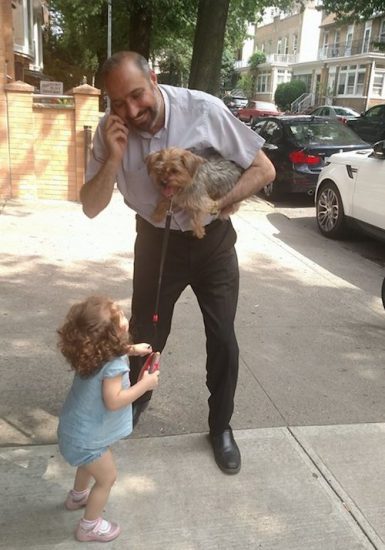
Those words that Father Khader tearfully conveyed remained with me, reminding myself that story of Father Khader’s race was never about him; the story is about a community rising in Bay Ridge. Just as the apostles faced the Romans, who oppressed and marginalized them, the love, trust, and community that they built together would be their force of resistance.
Father Khader’s campaign showed the potential that could be built out of that same trust and the fight for justice. Although the campaign was not won, the future of Bay Ridge would no longer be the same, as the force that came out for Father Khader was one to be reckoned with. It challenged a neighborhood literally divided and segregated along class, ethnicity upon avenue lines, and the establishment that had held power in the area for so long.
As for the political future of Bay Ridge, one of the legacies that Father K helped establish before leaving was the co-founding of Yalla Brooklyn, a newly formed 501(c)(4) organization that aims to establish the promotion of social welfare, and the combating of racism, sexism, and xenophobia in all forms. The organization is formed by a coalition of community members, including many former staff and volunteers from the campaign who remained a family post-election, bonded by a mission higher than than electing Father Khader into the City Council.
Their new mission: to ensure representation and dignity for communities in South Brooklyn that supports upcoming candidates and empowers the voters. Their goal is to make sure that disenfranchised members of the community will never again be turned away at the polls and discriminated against when engaging in a civic right that has been historically been denied to them.
Although it ended in a bittersweet loss, El-Yateem inspired a massive political movement in Bay Ridge, pushing a new generation of political perspectives to run unapologetically with uncompromising platforms. When he ran his campaign, El-Yateem was a rising star amongst a few progressive leaders who saw the rise of Trumpism as a call to take a stand for their communities. Now almost a year later, the tide has turned a new direction.
In New York City, aside from Alexandria Ocasio-Cortez, others such as Julia Salazar and Ross Barkan – who is hoping to represent the same district as Father K – are running for New York State Senate seats on socialist platforms that are no longer unprecedented. These platforms are fast gaining acceptance and popularity in mainstream politics.
“We’re not a one person movement; Father K leaving us will test us in that.”
In addition, Michigan and Minnesota voted in the Rashida Tlaib and Ilhan Omar, a Somali American Refugee, who will both become the first Muslim American Women in Congress. Tlaib, who has long been an advocate within the Arab American community in Detroit, and came out with full statements of support for BDS after being pushed by community, will also be the first Palestinian in Congress.
These wins accompanied a wave of Muslims who ran in the Midwest, including Abdul El-Sayed, who’s historic run for governor in Michigan ended with a loss but, similarly to Father Khader, led to an unprecedented historic moment, as more people voted in the primary than in last year’s presidential election.
Watching their campaigns from afar, I felt the energy and aspirations that we felt in Bay Ridge manifested across the country, and for a moment, I too wondered when would we get our victory. As I reflected on this thought, I remembered the words of my friend Abdullah Younis, who served as field director for Father Khader. When I bumped into him at the reception party after the sermon, I asked him what would El-Yateem’s loss mean to the community in Bay Ridge.
Younis’ answer held the essence of the story of the Pentecost and its message to the Apostles. “We are not a one-person movement; Father K leaving us will test us in that.”

